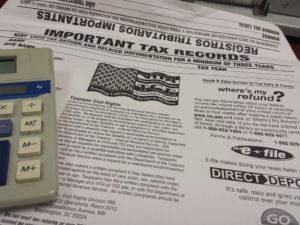Research Tax Credit

You probably found us by searching for “research tax credit” or “R&D tax credit audit.” We are glad you found us.
We are a tax law firm in Houston, Texas and we help defend R&D tax credits on audit, in appeals, and before the court.
Research and development tax credits can be a valuable tool for businesses looking to invest in innovation and development. However, without proper legal guidance, these credits can be difficult to obtain and defend. That’s where we come in – we have the expertise and experience to guide our clients through the process and provide effective solutions.
We understand that navigating the complex tax laws and regulations related to research and development tax credits can be challenging for businesses. That’s why we are here to provide expert legal support during an audit, assist with appeals, and represent clients in court if necessary.
About the R&D Tax Credit
The research tax credit provides a significant incentive to engage in research activities. It is one of several other targeted incentives, such as the solar tax credit.
The R&D tax credit was established in 1981–so it has been around for over forty years. It is one of the largest tax incentives provided by Congress available today. For many taxpayers, the tax savings can often far exceed any other legitimate tax planning strategy.
The R&D tax credit is a federal tax credit available to companies who incur qualified research expenses. This tax credit is designed to encourage companies to undertake additional research in the U.S. It was originally designed to help U.S. industries compete against foreign countries that offer some form of R&D incentive, while still trying to comply with the U.S.’s foreign trade agreements that prohibit incentives that favor our country’s development over others.
The research tax credit reduces the taxes companies would have to pay on their income. The credit could be as much as 20% of the research and development cost that is qualified for the credit. For example, if a company spends $100,000 in qualifying expenses, it can deduct 20% of that amount from its taxable income. This will be considered a nonrefundable tax credit on their Federal income tax returns.
Who Qualifies for the R&D Tax Credit?
Many businesses are not aware of the research tax credit. Many businesses are unaware of the benefits of R&D tax credits because they don’t know what they are, how to access them, or how to use them. This is because it is not widely reported in the media–unlike other tax credits and incentives.
The credit is not limited to taxpayers in the hi-tech or science industries. Taxpayers in just about any industry may qualify. This includes manufacturers, consultants (such as engineers or architects), or companies with in-house computer staff.
The R&D tax credit rewards businesses that spend money on research and development in the U.S. The credit is available for a number of years during which research is conducted, but it’s important to know when claiming the credit to do so in a timely manner.
Research and development (R&D) is the systematic practice of creating knowledge by investigating, experimenting, and designing. Generally, activities to design a product or process can qualify. Congress has added a number of requirements and limitations to try to clarify which design work qualifies.
The calculation for the credit is complicated. Wages, contract costs, supply costs, and certain computer rental costs can be included as qualified research expenses or QREs. The taxpayer’s gross receipts are also factored into the computation. The formula then compares these amounts for the current tax year to those for base years.
You can learn more about the R&D tax credit here.
The IRS’s Aggressive Approach to R&D Tax Credits
The R&D tax credit has also generated quite a bit of controversy between the IRS and taxpayers. The IRS frequently audits and litigates research tax credits. This is evidenced by the growing body of court cases for research credits.
Here are a few examples:
- Research Does Not Have to Be New to the World
- Gross Receipts from CFCs Excluded in Computing Research Tax Credit
- Ship Designs Qualify for the Research Tax Credit
- Revisiting Supply Expenses for the Research Tax Credit
- Foreign Branch Income is Gross Receipts for Research Tax Credit
- Research Was Not Routine, But Compensation Was Excessive
- Wages for Research Were Not Reasonable
- Taxpayer Can Pick & Choose Between Regulations
- Government Limits on Disclosing Information from Research Tax Credit Audit
We know these cases well. You can read more about the R&D tax credit rules here and R&D tax credit court cases here.
Defending Your R&E Tax Credits
We help clients defend their research tax credits. This includes helping with IRS and state audits, appeals and litigation for research tax credits.
We have defended hundreds of research tax credits.
If you have taken a research tax credit and the IRS is auditing your return, we want to hear from you. Call us at (713) 909-4906 or schedule an appointment to discuss your research tax credit case.
R&D Tax Credit Articles
- Website Development Tax Deductions & the Start-Up Rules
 There are several tax laws that have to be considered to determine when and how costs to develop websites are deductible. These expenses are almost always deductible. These tax laws raise timing questions. It’s a matter of when the expenses… Continue reading Website Development Tax Deductions & the Start-Up Rules
There are several tax laws that have to be considered to determine when and how costs to develop websites are deductible. These expenses are almost always deductible. These tax laws raise timing questions. It’s a matter of when the expenses… Continue reading Website Development Tax Deductions & the Start-Up Rules - Enough is Enough, But An Amended Tax Return is Not
 The process for reporting taxes can be more difficult than discerning whether a tax provision applies. This complexity stems from the level of information is required to be reported. The IRS reporting requirements continue increase every year. The IRS’s decision… Continue reading Enough is Enough, But An Amended Tax Return is Not
The process for reporting taxes can be more difficult than discerning whether a tax provision applies. This complexity stems from the level of information is required to be reported. The IRS reporting requirements continue increase every year. The IRS’s decision… Continue reading Enough is Enough, But An Amended Tax Return is Not - Research Tax Credit Records Must Be Kept for 40+ Years
 A frequent question is how long one has to keep records for tax purposes. The United States v. Quebe, No. 3:15-cv-294 (S.D. Ohio 2019) case provides the answer for research tax credits. The answer is that you have to keep… Continue reading Research Tax Credit Records Must Be Kept for 40+ Years
A frequent question is how long one has to keep records for tax purposes. The United States v. Quebe, No. 3:15-cv-294 (S.D. Ohio 2019) case provides the answer for research tax credits. The answer is that you have to keep… Continue reading Research Tax Credit Records Must Be Kept for 40+ Years
More articles about the research tax credit.
In 40 minutes, we'll teach you how to survive an IRS audit.
We'll explain how the IRS conducts audits and how to manage and close the audit.

